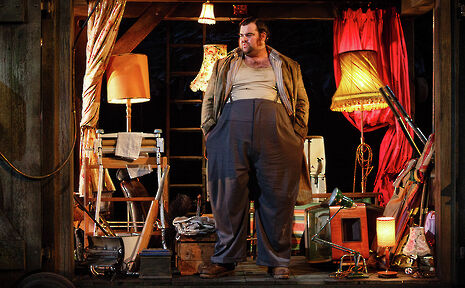Theatre: Steptoe and Son
Hannah Piercy is blown away by this uniquely poignant revival of a television classic

Steptoe and Son may seem a distant, half-recognised name to students today, but Kneehigh’s adaptation of the television programme broadcast 1962-1974 is acutely relevant in its insight to human nature, as well as joyously entertaining. The set, revolving around the trailer that the rag-and-bone men Albert and Harold Steptoe call home, is a miniature world that forms the backdrop for the compromises, arguments and reconciliations recognisable to all as part of family life.
“That’s what it amounts to don’t it… I’m trapped,” says Harold, played by Dean Nolan. But while Steptoe and Son certainly confronts dark and often bleak themes such as entrapment, old age and war, what is striking about the production is its sense of playfulness. The three actors who make up the company are unfailing in their energy: they commit to every movement, be it the characteristic twitch of Albert’s (Mike Shepherd) nose or the comic physicality of Harold dunking Albert in the sink to wash the “dirty old man”. The resourcefulness of Kneehigh as a company is evident in their ability to transform scene changes into joyful entertainment, with the setting up of the dining scene becoming a delightful sequence of father and son throwing about food and crockery.
Etta Murfitt’s choreography perfectly captures not only the era of the sixties and seventies, but the supressed longing for a woman in the men’s lives, and the surrealist nature of many aspects of the performance. The dialogue is naturalistic; the production overall is not, incorporating dance, audience engagement (at one point Dean Nolan’s quick wit is apparent as he responds to a spontaneous “aw” from the audience with “Don’t encourage him!”), and even shadow puppetry.
Artistic Director Emma Rice’s take on Steptoe and Son has many comic moments, but also retains a strong sense of tragedy. Kirsty Woodward, as the feminine presence who flits in and out of their lives, neither quite there nor wholly absent, is poignant in her dance with Shepherd, following his movements from behind so he is both alone and held in her arms. The bittersweet nature of this moment is brilliantly emphasised by the music: Sound Designer Simon Baker has certainly succeeded in his aim to “trigger memories” with the choice of The Way You Look Tonight.
All three actors deliver their roles perfectly, capturing the sense of play with comic moments such as Shepherd playacting Dracula, but also the prevailing tragedy. From the very beginning the audience is transfixed, following the lives of father and son with an interest that encourages us to examine our own relationships.
 News / Cambridge study finds students learn better with notes than AI13 December 2025
News / Cambridge study finds students learn better with notes than AI13 December 2025 News / Cambridge Vet School gets lifeline year to stay accredited28 November 2025
News / Cambridge Vet School gets lifeline year to stay accredited28 November 2025 News / Uni Scout and Guide Club affirms trans inclusion 12 December 2025
News / Uni Scout and Guide Club affirms trans inclusion 12 December 2025 Science / Did your ex trip on King’s Parade? The science behind the ‘ick’12 December 2025
Science / Did your ex trip on King’s Parade? The science behind the ‘ick’12 December 2025 Arts / Modern Modernist Centenary: T. S. Eliot13 December 2025
Arts / Modern Modernist Centenary: T. S. Eliot13 December 2025









